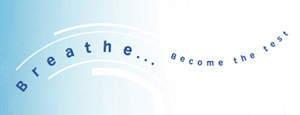

| Preparing for your exam . . . |
|---|
 Study.
Study. And then study some more. Knowing your stuff is the most important factor in your success. Start early, set a regular study schedule, and stick to it. Make your schedule specific so you know exactly what to study on a particular day. Write it down. Establish realistic goals so that you don’t build a mountain you can’t climb.
As to what you study, don’t just read aimlessly. Focus your efforts on what you need to know. Rely on a core group of dependable references, referring to others as necessary to firm up your understanding of specific topics. Let the ARDMS exam outlines guide you. And use different but complementary study methods—texts, flashcards, and mock exams—to exercise those neural pathways.
Ease down on studying the week before. Wind down, reduce stress, build confidence, and rest up. Don’t cram! And no studying the night before. You had your chance. Watch a movie, relax, go to bed early, and sleep well.
Organize your things the night before. Lay out comfortable clothes (including a sweater in case the testing center is cold), pencils, your ARDMS test-admission papers, car and house keys, glasses, prescriptions, directions to the test center, and any other personal items you might need. Be prepared!

| The day of your exam . . . |
|---|
 Eat lightly.
Eat lightly. You do not want to fall asleep during the exam. Go easy on the coffee or tea so your bladder doesn’t distract you halfway through the exam.
Arrive early. Plan to arrive at the test center early, especially if you haven’t been there before. Take directions, including the telephone number of the testing center in case you have to make contact en route. You don’t need a wrong-offramp adventure.
Be confident. As you wait for the exam to begin, smile, lift both hands, wave them toward yourself, and say, “Bring it on.”

 Read each question twice before answering.
Read each question twice before answering. Guess how easy it is to get one word wrong and misunderstand the whole question.
Try to answer the question before looking at the choices. Formulating an answer before peeking at the possibilities minimizes the distractibility of the incorrect answer choices, which in the test-making business are called—guess what!—
distractors.
Knock off the easy ones first. First answer the questions you feel good about. Then go back for the more difficult items. Next, attack the really tough ones. Taking notes on long or tricky questions often can jog your memory or put the question in new light. For questions you just cannot answer with certainty, eliminate the obviously wrong answer choices and then guess.
Guessing. Passing the exam depends on the number of correct answers you make. Because unanswered questions are counted as incorrect, it makes sense to guess when all else fails. The ARDMS itself advises that ”it is to the candidate’s advantage to answer all possible questions.” Guessing alone improves your chances of scoring a point from 0 (for an unanswered question) to 25% (for randomly picking one of four possible answers). Eliminating answer choices you know or suspect are wrong further improves your odds of success. By using your knowledge to eliminate two of the four answer choices before guessing, for example, you increase your odds of scoring a point to 50%.
Pace yourself; watch the time. Work methodically and quickly to answer those you know, and make your best guesses at the gnarly ones. Leave no question unanswered.
Don’t despair 50 minutes into the exam. At some point you may feel that things just aren’t going well. Take 10 seconds to breath deeply—in for a count of five, out for a count of five. Relax. Recall that you need only about three out of four correct answers to pass. If you’ve prepared reasonably well, a passing score is attainable even if you feel sweat running down your back.